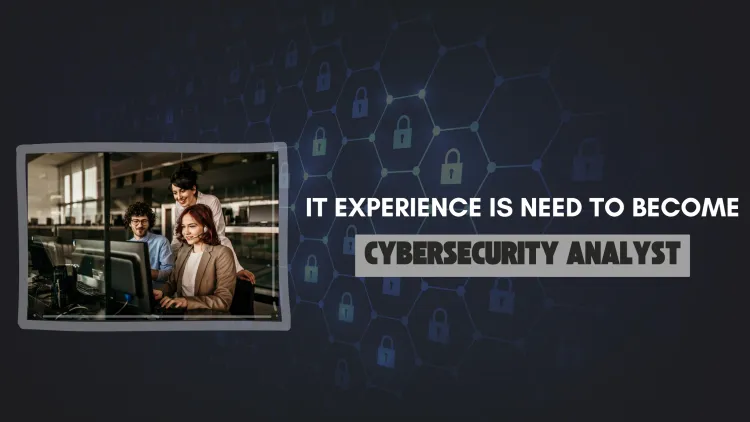Do I Need Prior IT Experience to Become a Cybersecurity Analyst ?
Becoming a cybersecurity analyst without prior IT experience is achievable through dedication and the right resources. By learning basic IT concepts, obtaining entry-level certifications like CompTIA Security+, gaining practical experience through hands-on practice, and developing both technical and soft skills, you can successfully enter the field. Although challenges like the learning curve and gaining practical experience may arise, the demand for cybersecurity analysts continues to grow, making it an excellent career path. With continuous learning and the right certifications, you can build a rewarding career in cybersecurity, even without formal IT experience.

In today’s digital world, the demand for cybersecurity professionals is skyrocketing as organizations are increasingly vulnerable to cyberattacks. This growing need for cybersecurity talent has opened up opportunities for individuals from diverse backgrounds to enter the field. However, many aspiring cybersecurity analysts wonder whether prior IT experience is necessary to pursue this career.
The good news is that while having prior IT experience can be beneficial, it is not a strict requirement for becoming a cybersecurity analyst. With the right mindset, certifications, and foundational knowledge, you can successfully enter the field and grow your career. In this blog, we will explore the role of a cybersecurity analyst, the skills needed, and how you can break into the industry even without prior IT experience.
What Does a Cybersecurity Analyst Do?
A cybersecurity analyst is responsible for protecting an organization’s systems and data from cyber threats. They monitor networks for potential security breaches, conduct vulnerability assessments, implement security measures, and respond to incidents. Their primary goal is to ensure that digital assets and sensitive information are kept secure from cybercriminals, malware, and other threats.
Cybersecurity analysts play a crucial role in ensuring the confidentiality, integrity, and availability of systems, data, and networks. They use various tools and techniques to detect, prevent, and mitigate potential threats to an organization's IT infrastructure.
Skills Needed to Become a Cybersecurity Analyst
While prior IT experience can provide a solid foundation, there are several skills you can develop on your own to become a cybersecurity analyst:
1. Basic IT Knowledge
Understanding basic IT concepts such as networking, operating systems, and system administration is essential for any cybersecurity professional. Although you don't need deep technical expertise, having a grasp of the following will make your transition smoother:
- Networking fundamentals: Learn about protocols like TCP/IP, DNS, HTTP, and SSL/TLS, which form the backbone of digital communication.
- Operating systems: Gain familiarity with popular operating systems such as Windows, Linux, and macOS.
- Basic system administration: Learn how to configure servers, manage users, and implement security measures.
2. Cybersecurity Tools
A cybersecurity analyst needs to be familiar with various security tools to identify and address vulnerabilities. Some commonly used tools include:
- Wireshark for network traffic analysis.
- Nmap for vulnerability scanning and network discovery.
- Burp Suite for web application security testing.
- Splunk for log management and analysis.
- Metasploit for penetration testing.
You can learn how to use these tools through online tutorials, courses, and hands-on practice.
3. Certifications
Certifications are one of the best ways to gain credibility and demonstrate your skills to employers, especially if you don't have prior IT experience. Many entry-level certifications are specifically designed for individuals who are new to the field. Some of the most recognized certifications include:
- CompTIA Security+: A foundational certification that covers essential cybersecurity concepts such as threat management, network security, and risk management. It is ideal for beginners.
- Certified Ethical Hacker (CEH): A more specialized certification that teaches ethical hacking and penetration testing.
- GIAC Security Essentials (GSEC): This certification provides a broad understanding of information security, including incident response, network security, and security protocols.
4. Soft Skills
Cybersecurity analysts need strong problem-solving abilities, attention to detail, and communication skills. You will often be required to explain complex technical issues to non-technical stakeholders, document incidents, and work in high-pressure situations. Strong soft skills will make you more effective in your role as a cybersecurity analyst.
5. Analytical Thinking and Problem-Solving
Cybersecurity analysts must analyze large volumes of data to identify suspicious activities or patterns that indicate a potential threat. Developing analytical thinking and problem-solving skills is essential for detecting vulnerabilities and determining appropriate responses.
How to Get Started Without Prior IT Experience
Even without a formal IT background, you can still break into the field of cybersecurity by following a few key steps:
1. Learn the Basics of IT and Cybersecurity
Start by gaining foundational knowledge of IT concepts such as networking, operating systems, and security principles. There are many free and paid resources available online, including YouTube tutorials, online courses on platforms like Udemy and Coursera, and books on cybersecurity basics.
2. Earn Entry-Level Certifications
Certifications like CompTIA Security+ and GIAC Security Essentials (GSEC) provide a solid foundation in cybersecurity and demonstrate your commitment to the field. These certifications can help you stand out to employers, even if you don't have prior IT experience.
3. Gain Practical Experience
Hands-on experience is crucial in cybersecurity. You can set up your own lab environment using virtual machines to practice using various tools and test different security configurations. Participating in capture-the-flag (CTF) competitions, bug bounty programs, and volunteer projects will also give you practical exposure to real-world security issues.
4. Build a Network
Networking with professionals in the cybersecurity field can help you gain insights into the industry and even find job opportunities. Attend cybersecurity events, join online communities and forums (e.g., Reddit, Stack Exchange), and participate in LinkedIn groups to connect with experts in the field.
5. Apply for Internships or Entry-Level Roles
Internships and entry-level roles like IT support or security operations center (SOC) analyst can provide valuable experience in a hands-on environment. Many employers offer on-the-job training and mentorship, which will allow you to further develop your skills while gaining experience.
Challenges Without Prior IT Experience
While you can certainly become a cybersecurity analyst without a formal IT background, there are some challenges to consider:
- Learning Curve: The field of cybersecurity can be complex, and the constant evolution of new threats and technologies may feel overwhelming. However, staying dedicated to continuous learning will help you overcome this.
- Hands-on Practice: Without prior IT experience, you may initially struggle with practical tasks such as network monitoring or system administration. It will require persistence and practice to become comfortable with these skills.
Conclusion
Becoming a cybersecurity analyst without prior IT experience is entirely possible, but it will require dedication, a willingness to learn, and the right resources. By gaining foundational IT knowledge, earning certifications, gaining hands-on experience, and continuously improving your skills, you can break into the field of cybersecurity and start a rewarding career protecting organizations from cyber threats.
The demand for cybersecurity analysts is higher than ever, and now is a great time to enter the field. By following the steps outlined in this blog, you can gain the skills needed to excel in this exciting and growing industry.
FAQs:
1. Do I need prior IT experience to become a cybersecurity analyst?
No, prior IT experience is not required. You can start by learning the basics of networking, operating systems, and security concepts.
2. What certifications should I pursue to become a cybersecurity analyst?
Entry-level certifications like CompTIA Security+, Certified Ethical Hacker (CEH), and GIAC Security Essentials (GSEC) are ideal for newcomers.
3. How can I gain practical experience without an IT background?
You can set up a personal lab environment, participate in capture-the-flag (CTF) competitions, or join internships and volunteer projects to gain hands-on experience.
4. What skills are necessary for a cybersecurity analyst?
Key skills include knowledge of networking, operating systems, cybersecurity tools, analytical thinking, problem-solving, and soft skills like communication.
5. Can I start as a cybersecurity analyst with no experience?
Yes, you can start with entry-level roles, internships, or even part-time positions that offer on-the-job training.
6. How long does it take to become a cybersecurity analyst without IT experience?
With the right certifications and training, it can take several months to a year to gain the necessary skills and knowledge.
7. Are soft skills important in cybersecurity?
Yes, soft skills such as problem-solving, attention to detail, and communication are critical in analyzing threats and working with non-technical teams.
8. What challenges will I face as a beginner in cybersecurity?
The main challenges include the learning curve of cybersecurity tools, concepts, and staying updated with rapidly evolving threats.
9. Can I advance in cybersecurity without a formal IT degree?
Yes, certifications, hands-on experience, and continuous learning can help you progress in your cybersecurity career, even without a formal IT degree.
10. Is cybersecurity a good career for someone without an IT background?
Yes, cybersecurity is a great career for individuals from diverse backgrounds, as long as you're committed to learning and developing your skills.














![Top 10 Ethical Hackers in the World [2025]](https://www.webasha.com/blog/uploads/images/202408/image_100x75_66c2f983c207b.webp)








